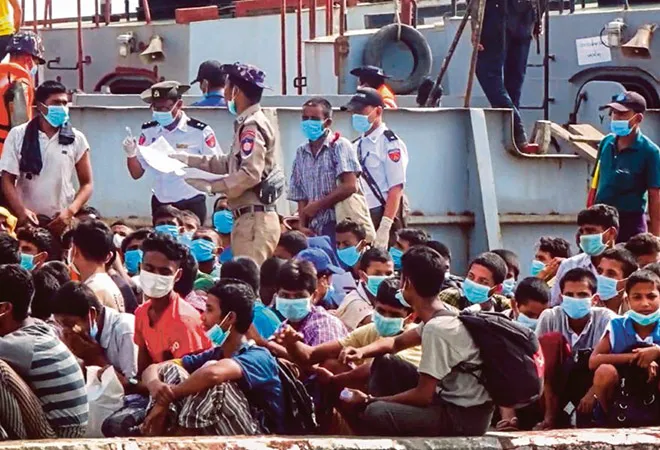
In what the United Nations (UN) has referred to as a risky ‘sport of human ping pong’, the displaced Rohingyas at sea are oscillating from one country to another in hopes of gaining entry to Malaysia or Thailand since February this year. While some were rescued by the coast guard when the boats had returned to Bangladesh in mid-April and early May, the apprehensions remained that more such trawlers are still at sea being denied access owing to the COVID19 scare.
The few hundreds of displaced Rohingyas rescued were severely emaciated, dehydrated and could barely walk due to a shortage of food and water. Several of them had died in the boat and their bodies were disposed off at sea. Such abysmal conditions has forced us to ponder that what propels these displaced people to venture out on such dangerous expedition and what happens to most of them eventually? For quite some time now, Malaysia and Thailand appear to be lucrative destinations for these hapless people. They believe that once they arrive there, it will put an end to their ongoing anguish of being in caged like circumstances with next to no economic or social engagements. Thus, they agree to commence unsafe sea journeys in search for better prospects.
However, behind these anticipated aspirations, a ruthless trafficking network lurks that preys on such vulnerable conditions. According to latest reports, the blight of human trafficking affects some 40 million people in South and South East Asia. Women and girls account for 71 percent of modern slavery numbers. Women and children particularly are enmeshed in an atrocious network of sexual exploitation, forced labour and coerced marriage.
The population of around 885, 000 Rohingyas currently reside in Bangladesh, and their stateless status and displacement has eroded their financial capabilities. Restriction of movement, the stalled repatriation efforts between the governments of Bangladesh and Myanmar coupled with isolation and desperation has heightened crimes like human trafficking to flow smoothly. Thus, men, women, and children are enticed either with false work assurance or are simply abducted. Once an offer is accepted, individuals are often trapped, abused, and not paid the agreed amount and even sometimes held for ransom until their family pays an exorbitant sum to rescue them. Physical and sexual form of abuse is common for women and children who are frequently forced into prostitution after accepting jobs as domestic workers. Men are coerced to work within inhuman conditions as bonded labourers. Ironically, the current COVID-19 pandemic may have saved these people from a fatal future ahead.
If one delves deeper into the issue, one may find the lack of reported cases quite intriguing. Reports received have always been in bits and pieces and a holistic figure remains absent. According to police records, 529 Rohingyas were rescued from trafficking in 2019 at the camps near Cox's Bazar. According to humanitarian organizations, this may just be the tip of the iceberg as the numbers for people that still remain under the clutches of human trafficking networks are unknown. One of the major recurring rationales behind unreported cases is the concept of ‘shame’. Coming from an extremely conservative community, the fear of being labeled and stigmatized in public hinders the parents, relatives, or spouses before reporting such crimes. Women and children, if rescued, refrain from narrating their harrowing experiences.
Another compelling reason, though quite perturbing, is the presence of corruption within the official ranks. The authorities within the camp areas at times are active or passive recipients to this offence and thus under-reporting seem more convenient option. However, if one looks closely, trafficking of displaced Rohingyas yearning for better economic opportunities is not a new phenomenon. Reports of such dangerous voyages along with inhuman abuses have appeared commonly between 2012 and 2015. Yet, the revival of this trend puts our minds at unease since the strong trafficking networks become more apparent. It questions and also puts the efficacy of national and regional security measures designed to stop such criminal ecosystems.
On a national level, Bangladesh along with the United Nations High Commissioner for Refugees (UNHCR) and International Organisation for Migration (IOM) is combating human trafficking with a 2018-2022 national plan of action to improve enforcement through better inter-agency coordination and improved training of officers. Nevertheless, trials of human traffickers are below average. Out of 5,000 cases filed against traffickers since 2013, only 30 cases of human trafficking have ended in convictions. Several cases were dismissed due to poor police investigations and lack of witnesses. The government is trying to set up special tribunals to expedite trials in human trafficking cases; however, the current pandemic has delayed the process.
The identification of government officials and personnel who are gaining from this crime is essential. Introducing provisions to address corruption will be critical towards an effective response. Capacity building in this regard will be of paramount importance to enable proper training and also flagging illegal financial deals. Besides, victim care remains unsatisfactory. Protective services for the victims of the crime should be at place. Rather than abusing or mistreating victims as perpetrators of the crime, they need proper care, medical attention as well as protection. Bangladesh is placed on the Tier-2 Watch List in the Trafficking in Persons (TIP) Report by the US Department of State for three consecutive years from 2017-19 and might slip to Tier-3 if it doesn’t work on the fault lines.
Given the enormity of the issue, the regional angle becomes pertinent. According to a UNHCR report, it is estimated that 33,600 refugees and migrants of various nationalities took to smugglers’ boats in Southeast Asia in 2015. The discovery of scores of mass graves believed to contain the bodies of Rohingya and Bangladeshi migrants in the border areas of Thailand and Malaysia created enormous international pressure. This prompted Thailand to enforce strict vigilance and suspend its officers responsible for facilitating the crime and punish the traffickers involved. It has also led Malaysia to provide legal permit for migrants and asylum seekers.
The 2016 Bali Declaration under the Bali Process, a regional structure dealing with people smuggling, trafficking, and transnational crime, was enforced which encouraged member countries to provide safety and protection to migrants, victims of human trafficking, refugees and asylum seekers. However, the current events are going against this narrative. The crime against the displaced continues to permeate. The ongoing trafficking crisis has shown how little the region is prepared and equipped to deal with such a movement of displaced people from one state to another. A major lacuna to draw a regional legal apparatus may be required since most of the countries of South and South East Asia especially the destination nations like Malaysia and Thailand are not signatories to the 1951 Refugee Convention. There have been efforts to strengthen domestic legislation as well as regional agreement to deal with the crisis.
Indonesia and Australia who co-chairs Bali Process have been approached to respond to the current crisis. The situation needs close monitoring if better regional cooperation is to lead improved protection for its displaced or stateless people. Robust legal machinery is required for those seeking opportunity and safety through migration. The current situation should be treated with the urgency that it demands. Therefore, integrated solutions both at the national and regional level are the need of the hour. If ignored, such crimes will continue to spill over along with the pandemic.
The views expressed above belong to the author(s). ORF research and analyses now available on Telegram! Click here to access our curated content — blogs, longforms and interviews.




 PREV
PREV


